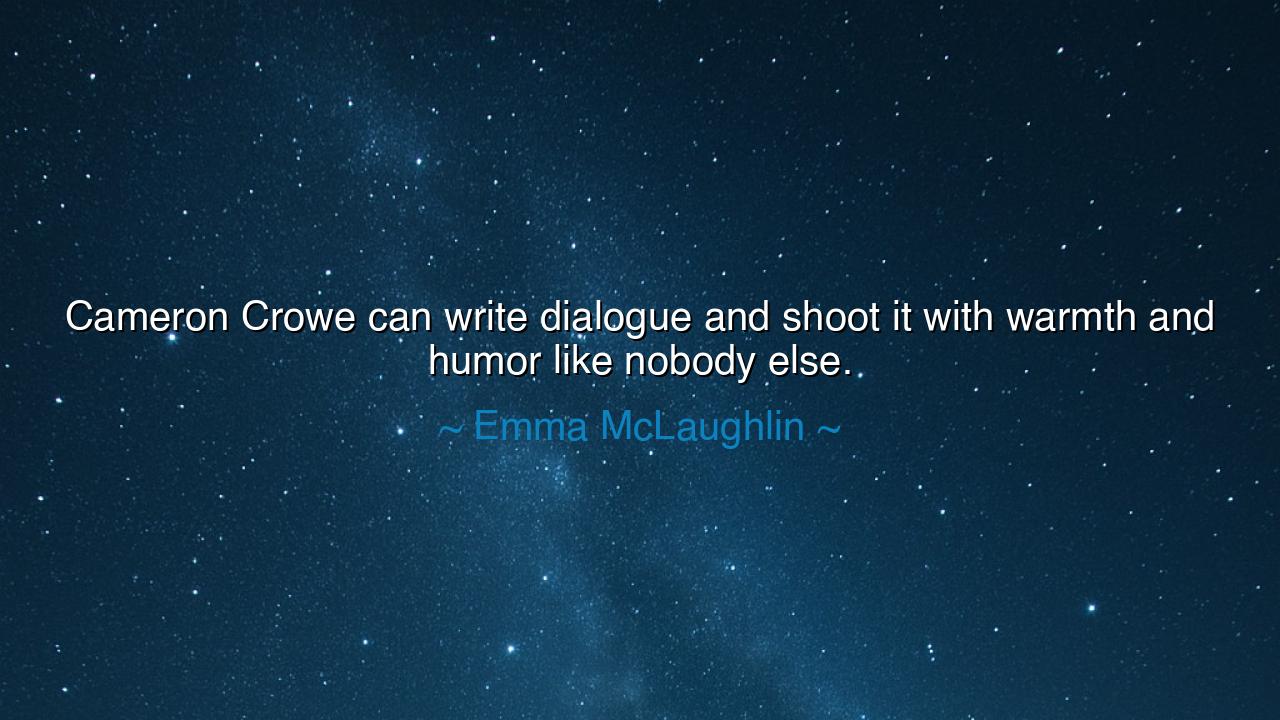
Cameron Crowe can write dialogue and shoot it with warmth and






In the vast realm of storytelling, where words are woven together to reveal the deepest truths of human nature, there is one who stands apart, his name etched in the annals of cinematic history: Cameron Crowe. Emma McLaughlin, in her tribute to this great writer and director, acknowledges a gift that only a few possess when she says, "Cameron Crowe can write dialogue and shoot it with warmth and humor like nobody else." In these simple yet profound words, McLaughlin touches on a deeper understanding—dialogue is not just the exchange of words, but the living, breathing pulse of a story. It carries with it warmth, the light that connects the audience to the characters, and humor, the force that softens even the harshest truths, allowing them to be felt and understood more deeply.
In the ancient world, storytellers understood that words had power, not just to inform, but to move the heart. The great Homer, in his epic Iliad, used dialogue to bring the gods and heroes to life, not through long speeches of grandeur, but through the simple exchanges of characters. These dialogues, woven with both grief and wit, revealed the complexities of the human soul. It is through the dialogue that we truly understand a character—what they love, what they fear, and what drives them. In the same vein, Cameron Crowe does not simply write words for his characters to speak. He writes moments of life, moments that are imbued with warmth and humor, making them real, relatable, and timeless.
The warmth that McLaughlin speaks of is the heart of Crowe’s work. Warmth is the bridge between the characters and the audience, a connection that transcends the screen. It is the deep understanding that, in the end, we are all human, bound by the same emotions—love, loss, hope, and regret. Think of Crowe's masterpiece, Almost Famous, a film that captures not just the rock-and-roll culture of the 1970s, but the universal themes of youth, dreams, and the search for belonging. In the dialogue between the characters—whether playful or serious—there is a warmth that invites the audience into a world they might not know but feel deeply. Crowe’s characters are not perfect, yet their flaws and strengths are wrapped in the tenderness of their humanity, allowing the audience to see themselves reflected in every line.
Humor, too, plays a crucial role in Crowe's artistry. The ancients knew that humor, far from being a frivolous diversion, is a powerful force that can reveal truth in ways that solemn words cannot. Aristophanes, the great Greek playwright, used humor not merely to entertain, but to deliver sharp critiques of society, politics, and the gods. His comedies, though filled with laughter, also invited reflection on the absurdities of life and the human condition. Similarly, Crowe’s humor is not just for amusement—it is an insightful reflection of the realities and absurdities of life. In Say Anything…, the iconic scene with the boombox held high above his head is not just a romantic gesture, but a humorous and deeply human moment of vulnerability, a reminder that love often brings both joy and awkwardness.
The beauty of Crowe's dialogue lies in its truth—the humor never undermines the seriousness of life’s moments. In a similar way, Sophocles, in his tragedies, wove humor into the fabric of his epic dramas, understanding that the absurdity of life could never be separated from its most tragic moments. A character like Oedipus, bound by fate and his own tragic flaw, still speaks in moments of irony and dark humor. Crowe, like Sophocles, invites the audience to laugh at life’s absurdities while also respecting the depth of the human condition. In doing so, his dialogue becomes a tool for both entertainment and illumination, helping us to navigate the complexity of human experience.
Thus, the lesson we must take from Crowe’s mastery of dialogue is clear: in our own lives, the words we speak must carry with them not just intellect, but warmth and humor. Whether in our personal relationships, our work, or our communities, we must strive to communicate with authenticity, allowing our words to be vessels of connection and compassion. The true power of communication lies not in the cleverness of the phrase, but in the humanity behind it. Just as Crowe crafts characters whose voices are filled with both humor and depth, so too must we use our words to connect with others, to share our truths, and to face life’s challenges with both heart and humor.
In our actions, then, let us seek to listen as much as we speak, to be open to the subtlety and depth of the human experience. Let us also embrace humor in its most sincere form—not to dismiss the gravity of life, but to illuminate the moments that bring us joy and understanding. Like Cameron Crowe, let us write our own dialogues, not just as a series of words, but as a reflection of our deepest truths, our hopes, and our shared humanity. For it is through these genuine exchanges, infused with both warmth and humor, that we find the true meaning of life—and in doing so, we inspire others to do the same.






AAdministratorAdministrator
Welcome, honored guests. Please leave a comment, we will respond soon